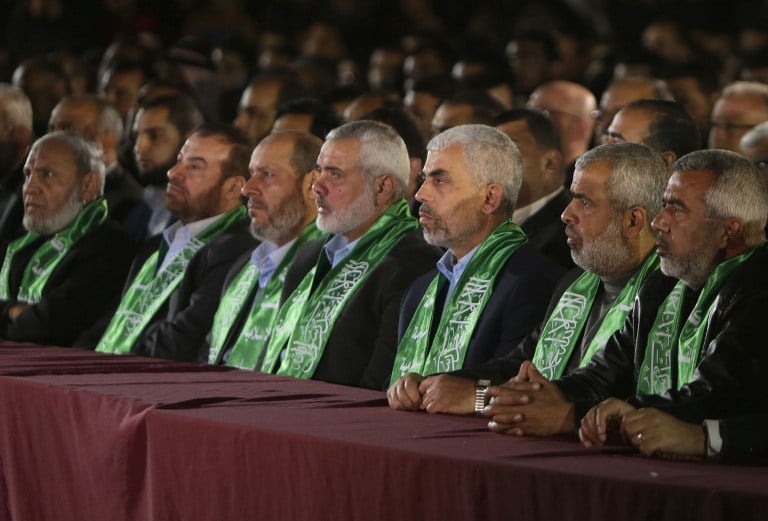Yes I learnt that you and Notch provide proof of Israel terrorising Palestinians, frequently destroying their buildings and killing their workers, which are embedded in the civilian population, that Notch claimed they weren't.You didn't learn anything from last night did you.
You are using an out of date browser. It may not display this or other websites correctly.
You should upgrade or use an alternative browser.
You should upgrade or use an alternative browser.
Israel under attack
- Thread starter Charlie George
- Start date
- Joined
- 22 Jan 2007
- Messages
- 23,435
- Reaction score
- 3,306
- Country

Those abstracts are contained within the 2017 charter I posted. Why do you believe the abstracts but dismiss the one I posted? It is obvious they are from the same document.The best you can hope for is the abstracts on Wkipedia which I have referred to and provided the links numerous times.
- Joined
- 22 Jan 2007
- Messages
- 23,435
- Reaction score
- 3,306
- Country

No, the 1998 charter is freely available from a number of sources, including Wikipedia.No, UK has designated Hamas as a terrorist organisation, and access to their publicised material is restricted.
Then why is the 2017 Hamas charter restricted in UK, if abstracts exist?Those abstracts are contained within the 2017 charter I posted. Why do you believe the abstracts but dismiss the one I posted? It is obvious they are from the same document.
Perhaps the abstracts are carefully selected for allowed reading material.
It's out-of-date. But more importantly, it existed in UK before Hamas were designated as a terorist organisation.No, the 1998 charter is freely available from a number of sources, including Wikipedia.
Don't forget the ludicrous treatment of Sinn Fein members not being allowed to speak on TV, but their voices were over-dubbed by actors.
In the 70's UK was a laughing stock over that policy. It only later learned to prevent access to material in good time.
- Joined
- 22 Jan 2007
- Messages
- 23,435
- Reaction score
- 3,306
- Country

Here is another link to the full 2017 charter, from Wikipedia.

 www.middleeasteye.net
www.middleeasteye.net

Hamas in 2017: The document in full
Hamas explains general principles and objectives in 42-article document
 www.middleeasteye.net
www.middleeasteye.net
- Joined
- 22 Jan 2007
- Messages
- 23,435
- Reaction score
- 3,306
- Country

I have now found it easily, twice. Yet you claim it isn't the real one.Then why is the 2017 Hamas charter restricted in UK,
Far better, but still has to abide by UK's provisions to allow it to continue operating.Here is another link to the full 2017 charter, from Wikipedia.

Hamas in 2017: The document in full
Hamas explains general principles and objectives in 42-article documentwww.middleeasteye.net
Middle East Eye (MEE) is a London-based news website
MEE is edited by David Hearst, a former foreign leader writer for the British daily, The Guardian
Cyberattack
In April 2020, MEE was one of 20 websites targeted by hackers that cybersecurity experts, ESET, have linked to an Israeli surveillance company called Candiru. The website was impacted using a Watering hole attack which serves malicious code to certain visitors allowing the attackers to compromise their PCs.

Middle East Eye - Wikipedia
The Israeli Declaration of Independence also has some worrying issues, allowing it to legally (under Israeli law) to operate an apartheid system, which it does with impunity.
Paragraph 13 of the Declaration provides that the State of Israel would be based on freedom, justice and peace as envisaged by the prophets of Israel; it will ensure complete equality of social and political rights to all its inhabitants irrespective of religion, race or sex;. However, the Knesset maintains that the declaration is neither a law nor an ordinary legal document.[33] The Supreme Court has ruled that the guarantees were merely guiding principles,
Israeli Declaration of Independence - Wikipedia
Thye're both the same, just different linksI have now found it easily, twice. Yet you claim it isn't the real one.
And
Far better, but still has to abide by UK's provisions to allow it to continue operating.
Middle East Eye (MEE) is a London-based news website
MEE is edited by David Hearst, a former foreign leader writer for the British daily, The Guardian
Cyberattack
In April 2020, MEE was one of 20 websites targeted by hackers that cybersecurity experts, ESET, have linked to an Israeli surveillance company called Candiru. The website was impacted using a Watering hole attack which serves malicious code to certain visitors allowing the attackers to compromise their PCs.

Middle East Eye - Wikipedia
- Joined
- 22 Jan 2007
- Messages
- 23,435
- Reaction score
- 3,306
- Country

Far better? You don't believe it is the correct Hamas document but you don't know what/where the correct one is. There is a problem with that.Far better
- Joined
- 22 Jan 2007
- Messages
- 23,435
- Reaction score
- 3,306
- Country

Of course they are. How many 2017 Hamas Charters do you think there actually are?Thye're both the same, just different links
- Joined
- 22 Jan 2007
- Messages
- 23,435
- Reaction score
- 3,306
- Country

I meant they are two links to the same website. It's not two different sources, as you thought.Of course they are. How many 2017 Hamas Charters do you think there actually are?
To put you out of your misery, if you look at the 2017 charter, you will see that Palestine is very happy to co-exist with the Israelis, except they won't recognise them as Israelis, because they refuse to recognise the state of Israel, but they welcome Jews in co-existence.
They also resist what they call the Zionists who want to eradicate Palestinians.
And in contrast, Israel will co-exist with Palestinans, except they'll legally operate apartheid.
All thanks to the UK and Balfour and the UN for failing miserably to enforce sufficent rules in separating Palestine and failing to sufficiently consider the Palestinians.
It's been well and truly left to the individual factions to fight it out among themselves.
The US forsaw problems but for the wrong reasons, They were obsessed with Communist influence.
But they acquiesced over their concerns.
On November 29, 1947 the United Nations adopted Resolution 181 (also known as the Partition Resolution) that would divide Great Britain’s former Palestinian mandate into Jewish and Arab states in May 1948 when the British mandate was scheduled to end. Under the resolution, the area of religious significance surrounding Jerusalem would remain a corpus separatum under international control administered by the United Nations.
Although the United States backed Resolution 181, the U.S. Department of State recommended the creation of a United Nations trusteeship with limits on Jewish immigration and a division of Palestine into separate Jewish and Arab provinces but not states. The State Department, concerned about the possibility of an increasing Soviet role in the Arab world and the potential for restriction by Arab oil producing nations of oil supplies to the United States, advised against U.S. intervention on behalf of the Jews. Later, as the date for British departure from Palestine drew near, the Department of State grew concerned about the possibility of an all-out war in Palestine as Arab states threatened to attack almost as soon as the UN passed the partition resolution.
Despite growing conflict between Palestinian Arabs and Palestinian Jews and despite the Department of State’s endorsement of a trusteeship, Truman ultimately decided to recognize the state Israel.
- Joined
- 22 Jan 2007
- Messages
- 23,435
- Reaction score
- 3,306
- Country

Which one? You claimed the one I linked to wasn't the correct one? Do you now accept it is in indeed the current Hamas 2017 charter?if you look at the 2017 charter
There is. The internet is awash with misinformation, and especially on this issue.Far better? You don't believe it is the correct Hamas document but you don't know what/where the correct one is. There is a problem with that.
Similar threads
- Replies
- 344
- Views
- 9K
- Replies
- 20
- Views
- 4K
- Replies
- 23
- Views
- 4K
